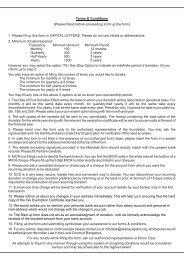The Top 100 NGOs 2013. - Akshaya Patra
The Top 100 NGOs 2013. - Akshaya Patra
The Top 100 NGOs 2013. - Akshaya Patra
Create successful ePaper yourself
Turn your PDF publications into a flip-book with our unique Google optimized e-Paper software.
I tried to get at this by drawing – a<br />
probably crude – contrast between<br />
an NGO like Amnesty International,<br />
which has a mass membership base,<br />
but rather weak ties to any particular<br />
government historically, and Human<br />
Rights Watch, whose emergence was<br />
inconceivable unless you know what the<br />
State Department was thinking, and<br />
– through the Ford Foundation – was<br />
doing. Certain <strong>NGOs</strong> really conform<br />
to the Vladimir Putin view of what an<br />
NGO is – state policy by other means.<br />
It is rife with ethical and real confusion.<br />
I think we need a much more nuanced<br />
view of what <strong>NGOs</strong> are – some are<br />
good, and some are not. <strong>The</strong>y have<br />
very different kinds of relationships to<br />
political power. Yet, most of us, most of<br />
the time, see <strong>NGOs</strong> as expressions of a<br />
kind of civil society, and sometimes that<br />
is just not true.<br />
On foundations, I have no doubt that<br />
some do great work. But, they have<br />
very limited accountability. I think<br />
they are the product of the mistrust<br />
of government and the public sector I<br />
identified as a problem in our time. I’m<br />
old fashioned in these matters. I wish<br />
we had a different tax regime so that<br />
the wealth of foundations disappeared<br />
and states and public agencies were able<br />
to use it themselves. I think we would<br />
have a more transparent and more<br />
accountable social policy as a result. I<br />
find it quite troubling to think that a<br />
billionaire can have a decisive impact on<br />
the public health regime of a country, or<br />
on the educational system of a country –<br />
that doesn’t seem to me something that<br />
we should be particularly happy about.<br />
When you look at the Balkans and the<br />
Middle East in the late 19th<br />
and early 20th century, this was also<br />
an era of great philanthropy. <strong>The</strong>re<br />
were no social services. <strong>The</strong>re were just<br />
charities that depended on the money<br />
that would come from the very wealthy.<br />
Well, that was fine as far as it went, but<br />
I think things improved in the course of<br />
the 20th century, and to a certain extent<br />
are now going backwards. But that<br />
probably makes me a bit of<br />
a dinosaur.<br />
Do you regard this contemporary<br />
mistrust of government though<br />
– and election season in the US<br />
certainly brought the sentiment<br />
to the fore – as a worldwide<br />
phenomenon?<br />
gloBal voices gloBal voices<br />
No, emphatically not. One of the things<br />
I think is quite positive in some ways<br />
about the rebalancing of power globally<br />
is that many of the new powers, for<br />
their own historical reasons, have a<br />
much less negative view of what the<br />
state can do. Maybe you can already see<br />
that beginning to affect the behavior of<br />
international organizations. It’s quite<br />
striking. Perhaps it was going to happen<br />
anyway. <strong>The</strong> IMF starts sounding a<br />
lot more Keynesian these days than<br />
it did ten years ago – it is a chastened<br />
organization. But it also represents a<br />
power shift. Of course, it helps that<br />
US policy is more Keynesian too. But<br />
I’m sure it also reflects the power shift<br />
towards the BRICs and other countries.<br />
So no, I do not think it is a global<br />
phenomenon. I think you are right.<br />
Globally, the position is much<br />
more nuanced.<br />
‘I find it quite<br />
troubling to think<br />
that a billionaire<br />
can have a<br />
decisive impact<br />
on the public<br />
health regime of a<br />
country, or on the<br />
educational system<br />
of a country.’<br />
In the final chapter of the book,<br />
you allude to how the rise of<br />
the BRICS has the potential to<br />
breathe new life into the UN.<br />
How do you envisage this will<br />
happen? And how could it impact<br />
other emergent forms of global<br />
governance?<br />
So firstly, a health warning. One always<br />
wants to know about the future, but<br />
in a funny way the book is a history of<br />
futures. <strong>The</strong>re seems to be something<br />
about thinking about how the world is<br />
governed that makes it impossible not to<br />
wonder about what is going to happen<br />
next. After one has been through 200<br />
years of people pontificating about that<br />
<strong>The</strong> gloBal Journal + January & FeBruary 2013<br />
topic, I find myself very reluctant to<br />
add to the list. I think you can say a few<br />
things, however, about an institution<br />
like the UN. It was set up not to be<br />
terribly effective, because as long as<br />
there was great power disagreement, it<br />
would not be able to do anything. But<br />
for that reason, it was set up in a way<br />
that would make participation always<br />
attractive for great powers. So I don’t<br />
see any reason why an increasingly<br />
prosperous China, for instance, should<br />
do anything other than reinforce the<br />
UN, cement its role in the organization,<br />
and continue the policy that it has<br />
pursued at least since the 1970s, if not<br />
earlier. What the BRICS may bring to<br />
the UN and other agencies will be what<br />
you identified, a much less suspicious<br />
attitude towards the state.<br />
Of course, be careful what you wish for.<br />
A less suspicious attitude towards the<br />
state may bring with it a whole host of<br />
new difficulties. It is all very well to be<br />
critical of human rights regimes, but<br />
do we want a UN in which the human<br />
rights regime is completely defanged, or<br />
people stop talking about human rights<br />
altogether? From one point of view, the<br />
Chinese version of development aid<br />
to Africa is much more acceptable to<br />
many African states than the Western<br />
IMF version. But it will turn out to have<br />
its own strings attached, so I do not<br />
think the Chinese ascendancy is going<br />
to usher in a world where there are no<br />
powerful states that do what they like,<br />
and weak states that feel much more<br />
constrained. That is going to remain.<br />
Interestingly, you also criticize<br />
a concept that has been seen by<br />
many as having the potential to<br />
bring new relevance to the UN<br />
in the realm of security – the<br />
‘Responsibility to Protect’ (R2P)<br />
– as evoking historic notions of a<br />
‘civilizing mission.’<br />
Well, the problem was the concept<br />
became militarized very quickly for<br />
many people. It became attractive to<br />
the leadership of the UN because they<br />
understood it was attractive to the<br />
Americans and British, but particularly<br />
the Americans. Really, the UN has only<br />
been effective historically when acting<br />
in sync with the world’s largest power.<br />
I saw that as the Kofi Annan mission to<br />
move the UN out of this oppositional<br />
relationship, and if that meant R2P,<br />
then that was good. It would make<br />
the UN more relevant. But as some<br />
US Senate isolationists said about the<br />
League of Nations in 1919, the fact<br />
the whole world might be calling for a<br />
policy does not necessarily make it a<br />
good one.<br />
One of the potentially quite dangerous<br />
things about the UN is that there are<br />
few checks and balances. If leading<br />
states determine on a certain course of<br />
action where a particular smaller state<br />
is concerned, there is very little to stop<br />
them. Small states can do very little,<br />
because they know they would be worse<br />
off in a world without the UN. But from<br />
the perspective of a number of small<br />
states, I think R2P must have looked<br />
very much like the regime of the 19th<br />
century, where Western powers were<br />
constructing an international order<br />
that was premised on the idea that they<br />
were civilized, and were going to bring<br />
civilization to others. What was the<br />
key criterion of civilization? It was the<br />
capacity and behavior of a state. You<br />
could see that in the way they treated<br />
the Ottomans, you could see it in the<br />
way they treated the Chinese, and you<br />
could see it in the way they treated<br />
African peoples. If you did not have a<br />
state, woe betide you – people could do<br />
with you what they wanted. And if you<br />
did have a state, but it was deemed to be<br />
barbaric, then you would also very often<br />
find yourself being told what to do in<br />
the name of civilization.<br />
That was the story of the 19th and the<br />
early 20th centuries. It is only in the last<br />
20-30 years that historians have started<br />
to unpack that story. But once you do,<br />
you see that what started happening in<br />
the 1990s often looked rather similar. I<br />
do not say this as an outright opponent<br />
of intervention – I was somebody<br />
who believed there should have been<br />
intervention much earlier than there<br />
was in the Balkans. But what worried<br />
me in the way these concepts were used<br />
by Tony Blair and others was a kind of<br />
thoughtless universal moralizing,<br />
which was very reminiscent of the<br />
late 19th century. And there were two<br />
problems. One was that it would lead<br />
you into unforeseen situations.<br />
<strong>The</strong> second was that you took no<br />
account of how this sounded to people<br />
who had a much better memory of the<br />
19th century than you did.<br />
How will we feel about it when<br />
the Chinese start to talk about the<br />
Responsibility to Protect in Gaza?<br />
That will be the test.<br />
You note in the book how it<br />
is very rare for international<br />
organizations to die – they<br />
either evolve, or endure in an<br />
increasingly diminished form.<br />
Why do you think it is so hard<br />
to reform our international<br />
architecture?<br />
‘<strong>The</strong> desire to<br />
reform the UN is a<br />
kind of last vestige<br />
of the dream that<br />
so many people<br />
once had, of a<br />
single powerful<br />
organization that<br />
would incarnate<br />
humanity’s wishes.<br />
I think too many<br />
people are beyond<br />
that dream now for<br />
it to really matter.’<br />
<strong>The</strong>re are two questions really. Why<br />
don’t they die? And why is it difficult to<br />
reform them? I’ve never really thought<br />
about the question of why they do not<br />
die, but I guess one reason is that you<br />
only kill off political organizations if<br />
they are a threat to you. <strong>The</strong> classic<br />
case would be the Allied mission to<br />
terminate Prussia in 1947. You do that<br />
because Prussia symbolizes a massive<br />
threat. What international agency ever<br />
symbolizes such a significant threat?<br />
On the whole, they are just not that<br />
powerful. <strong>The</strong>re was an amazing case<br />
where the UN was asked to adjudicate<br />
in the late 1940s whether the League<br />
of Nations minority rights regime still<br />
prevailed, because nobody had actually<br />
scrapped it. Clearly it could have gone<br />
either way, but fortunately lawyers gave<br />
the right answer – yes, it was no longer<br />
<strong>The</strong>gloBalJournal.neT<br />
12 13<br />
in existence. But even that kind of very<br />
definitive answer is not very<br />
often required.<br />
<strong>The</strong> lack of power of international<br />
organizations might be part of the<br />
answer as to why it is so difficult to<br />
reform them. <strong>The</strong>re is just not enough<br />
at stake for most people. At the point<br />
at which the League was reformed –<br />
and the UN is essentially a reformed<br />
League, not a new organization – it had<br />
virtually ceased to exist. It was a tiny<br />
rump shadow of what it had been, so<br />
you could start again. An organization<br />
like the UN is there – it’s bigger than<br />
ever. <strong>The</strong>re is this wonderful figure,<br />
Robert Jackson, who pops up now<br />
and again in the book. Somebody like<br />
Jackson in the late 1940s – had he been<br />
allowed – could have had an impact. But<br />
by the late 1960s, when he was asked to<br />
write a report on what it would take [to<br />
reform the UN], he basically threw up<br />
his hands in horror. I am not an expert<br />
on the UN, and better people than I<br />
have spent years of their lives writing<br />
reform agendas. All I know is that<br />
people have been talking about it for a<br />
long time – it is symbolically important,<br />
but not in practical terms. <strong>The</strong> desire to<br />
reform the UN is a kind of last vestige<br />
of the dream that so many people once<br />
had, of a single powerful organization<br />
that would incarnate humanity’s wishes.<br />
I think too many people are beyond that<br />
dream now for it to really matter.<br />
Why do you think that is?<br />
Well, huge disillusionment exists about<br />
how the UN has worked. But how<br />
people think about the international<br />
is completely connected to how they<br />
think about the national. Concepts<br />
shift from one sphere to the other<br />
very easily – I don’t think the two are<br />
detachable. On the whole, people’s<br />
trust in politicians generally is very<br />
low. People’s trust in government is<br />
very low. Actually, people’s trust in<br />
organization is very, very low. We are<br />
in a kind of quasi-anarchistic age. Not<br />
necessarily a left anarchism, but a<br />
kind of extreme individualism that is<br />
reinforced by a lot of idolatry about the<br />
Internet – about forms of mobilization<br />
that require no organization. People are<br />
not very persuaded of the benefits of<br />
organization in general. <strong>The</strong>y can see<br />
the value of states in their own lives. In<br />
countries like France, people just do not





